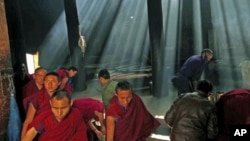Media rights advocacy group Reporters Without Borders says Chinese authorities openly threaten with “torture” those who circulate information on the situation in Tibet.
In its statement Thursday, the Paris-based group expressed outrage at the policy of terror, which it said is openly pursued by the Chinese authorities in Gan Lho Tibetan Autonomous Prefecture in the northwestern province of Gansu. The statement says police have posted notices in public places in which those who circulate certain views and information are threatened with "beating" and "torture."
It says the information on the posted notices was exposed in Tibet Post International and a Tibetan news website based in Dharamsala, India, the center of exiled Tibetans.
Reporters Without Borders says that the aim of the torture threats is "to instill terror in all those who might circulate information about the government’s repressive policies" against Tibetans. The group warns that posting warnings of physical reprisals is in violation of Article 2 of the international Convention against Torture and Other Cruel, Inhuman or Degrading Treatment or Punishment, which China has signed.
The group has called on the U.N. Special Rapporteur on torture, Juan Mendez, to open an investigation into the reports on the threatening notices and to condemn the authorities for using such threats.
Tibetans have protested what they call increasing repression by the Chinese authorities in the Tibetan-populated areas. At least 20 have died in the past year after setting themselves on fire in protest of the government policies in Tibet.
Chinese officials say the unrest in Tibet is instigated by the exile groups who want to separate the autonomous province from China. They especially blame Tibet's spiritual leader, the Dalai Lama, for spurring violence and condoning self-immolations. The Dalai Lama claims he is only fighting to preserve the Tibetan culture and religion.
News
China Reportedly Threatens 'Torture' For Tibet Informants




